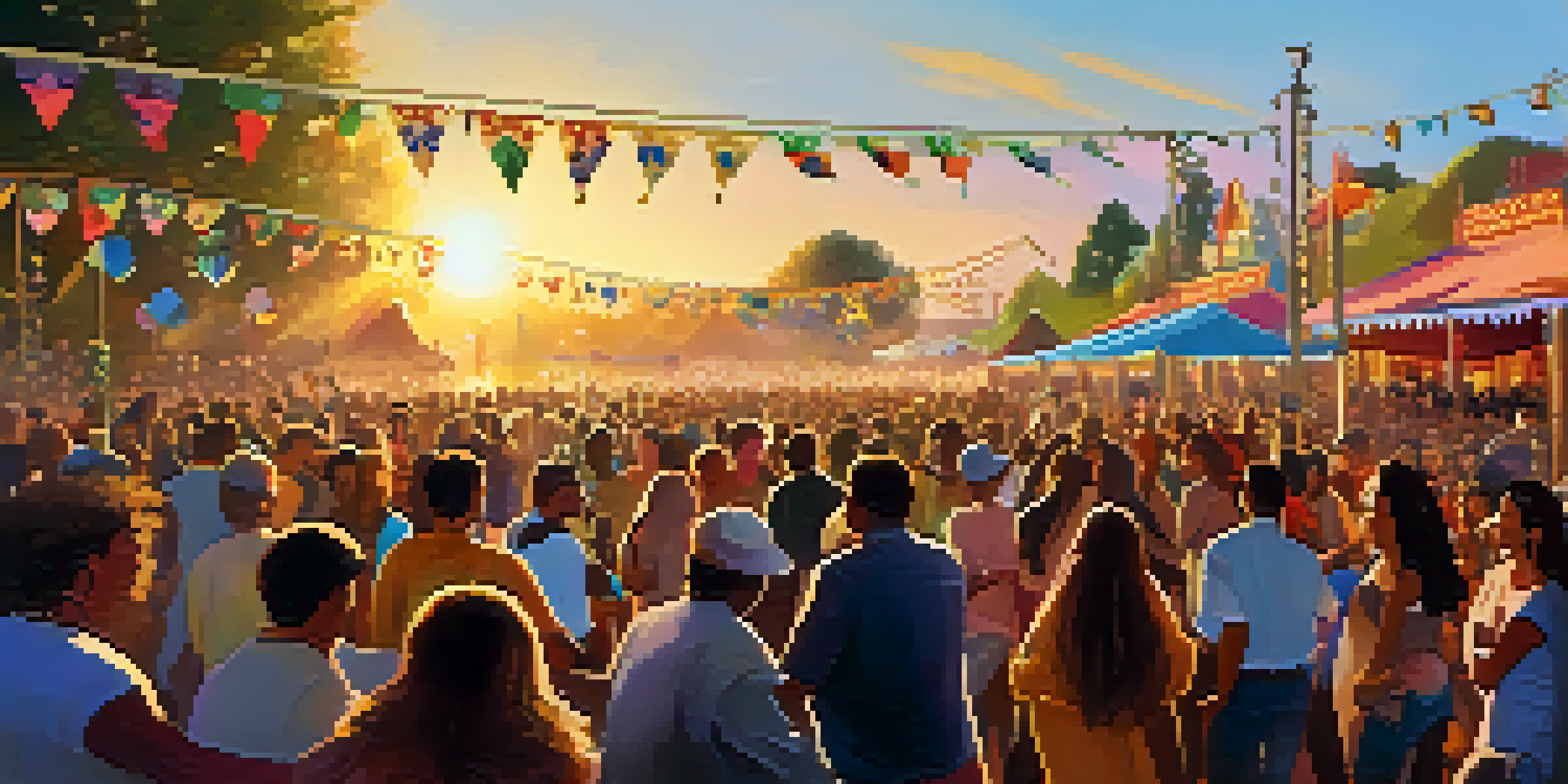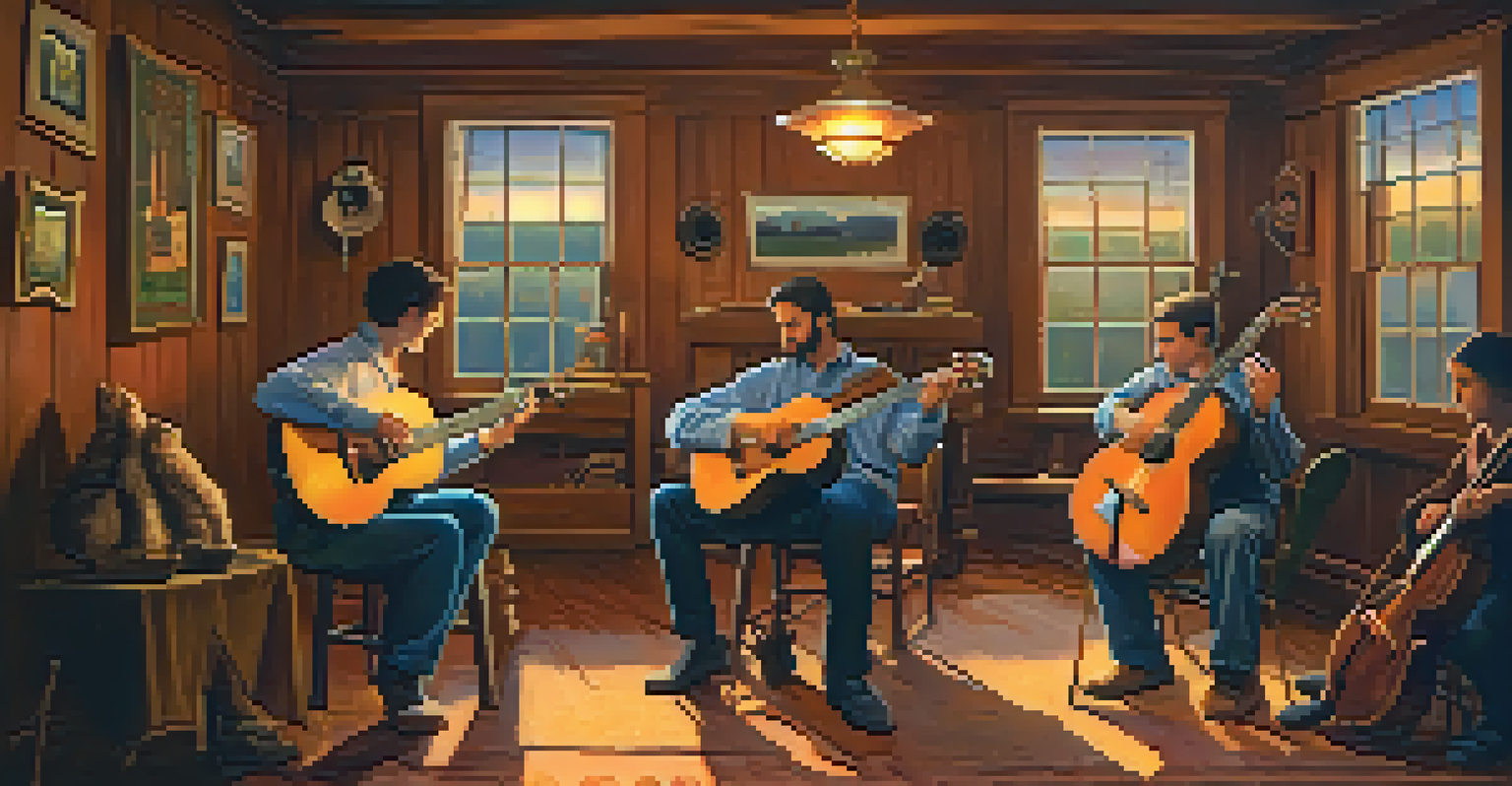Folk Music: A Channel for Cultural Resistance and Identity

Understanding Folk Music's Role in Culture
Folk music is more than just a genre; it's a vessel for cultural expression. It reflects the stories, struggles, and traditions of communities. By capturing local dialects, instruments, and themes, folk music serves as a powerful reminder of cultural heritage.
The role of folk music in expressing cultural identity and social change is invaluable. It captures both the struggles and triumphs of communities.
Through its rich history, folk music has connected generations, allowing them to share their experiences and values. This connection fosters a sense of belonging and identity, especially in times of social change. As communities face challenges, folk music becomes a rallying point for unity and resilience.
Moreover, the simplicity of folk music makes it accessible to everyone. With its catchy melodies and relatable lyrics, it invites participation from all walks of life. This communal aspect reinforces its role as a cultural cornerstone, highlighting the importance of shared experiences.
Folk Music as a Tool for Cultural Resistance
Throughout history, folk music has often acted as a form of resistance against oppression. During times of political unrest, musicians have used their art to voice dissent and challenge the status quo. Songs of protest resonate deeply, often becoming anthems for movements.

For example, during the Civil Rights Movement in the United States, folk songs like 'We Shall Overcome' galvanized communities and inspired change. These songs not only captured the struggles of the time but also offered hope and solidarity. This illustrates how folk music can empower individuals and communities to resist oppression.
Folk Music as Cultural Expression
Folk music serves as a powerful vessel for cultural heritage, reflecting the stories and struggles of communities.
In many cultures, traditional folk songs have been revitalized to address contemporary issues, ensuring their relevance. By weaving modern struggles into the fabric of folk music, artists keep the spirit of resistance alive, proving that this genre remains a potent voice for change.
The Connection Between Folk Music and Identity
Folk music plays a significant role in shaping cultural identity. It helps individuals connect with their roots and fosters pride in their heritage. By immersing themselves in the sounds and stories of their ancestors, people can better understand their place in the world.
Folk music is the sound of the people; it is a form of resistance that speaks truth to power and inspires hope.
Different regions have unique folk music styles, each telling its own story. For instance, Appalachian folk music, with its banjos and fiddles, conveys the history of early American settlers, while Irish folk music tells tales of migration and resilience. This diversity enriches the global tapestry of cultural identities.
As artists explore their ancestry through music, they often blend traditional elements with modern influences. This fusion not only honors their heritage but also creates a dynamic dialogue between past and present. In this way, folk music becomes a living expression of identity.
Modern Folk Artists and Their Impact
Today, many contemporary folk artists continue the tradition of using music for cultural expression and resistance. Musicians like Joan Baez and Bob Dylan paved the way, but newer artists are also making waves. Names like Rhiannon Giddens and Hozier are infusing folk with fresh perspectives while addressing modern issues.
These artists often draw from their own experiences, highlighting themes such as social justice, environmental concerns, and personal struggles. By doing so, they maintain the relevance of folk music in today’s society. Their songs resonate with audiences, inspiring them to reflect on their own identities and communities.
Resistance Through Folk Music
Throughout history, folk music has been a tool for resistance, uniting communities and inspiring change during times of oppression.
Moreover, the rise of digital platforms has allowed for a wider distribution of folk music. Musicians can now reach global audiences, sharing their stories and cultural messages far beyond their local communities. This accessibility ensures that the rich tradition of folk music continues to thrive and evolve.
Folk Music Festivals: Celebrating Culture and Community
Folk music festivals serve as vibrant celebrations of culture and community, bringing together diverse audiences. These events often showcase local and international artists, allowing them to share their stories through music. Attendees can immerse themselves in different cultural experiences, fostering understanding and appreciation.
Festivals also create spaces for dialogue and collaboration among musicians and attendees. Workshops, discussions, and performances encourage the exchange of ideas and traditions. This communal atmosphere strengthens bonds and highlights the role of folk music in building a cohesive community.
Additionally, folk festivals often emphasize the importance of preserving cultural heritage. By promoting traditional music and practices, these events help ensure that future generations remain connected to their roots. This focus on sustainability reinforces folk music's role in cultural continuity.
The Evolution of Folk Music in the Digital Age
The digital age has transformed how folk music is created, shared, and experienced. With platforms like YouTube and Spotify, artists can easily distribute their music to a global audience. This accessibility has allowed folk music to reach new listeners who might not have encountered it otherwise.
Social media also plays a crucial role in promoting folk music and connecting artists with fans. Musicians can share their journeys, engage with audiences, and build communities online. This direct interaction fosters a sense of belonging among fans, creating a new kind of cultural engagement.
Digital Age and Folk Music's Evolution
The digital age has transformed folk music's accessibility, allowing artists to reach global audiences while navigating challenges like cultural appropriation.
However, the digital landscape also presents challenges, such as the risk of cultural appropriation. As folk music crosses borders, it’s essential to respect and honor its origins. By being mindful of these issues, artists and listeners can help ensure that folk music remains a genuine expression of cultural identity.
The Future of Folk Music and Cultural Identity
The future of folk music is bright, with its ability to adapt and evolve in response to changing societal landscapes. As new generations of artists emerge, they bring fresh perspectives that reflect contemporary issues and experiences. This adaptability ensures that folk music remains relevant and impactful.
Additionally, as global connectivity increases, folk music can continue to draw inspiration from diverse cultures. This cross-pollination enriches the genre, allowing for new sounds and narratives to emerge. By embracing this diversity, folk music can further strengthen its role as a channel for cultural expression and resistance.

Ultimately, as long as people continue to share their stories and experiences through music, folk music will thrive. It will remain a vital tool for cultural identity and resistance, connecting individuals across time and space. The journey of folk music is ongoing, and its future holds endless possibilities.